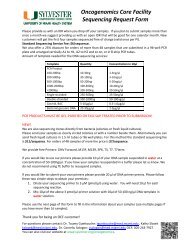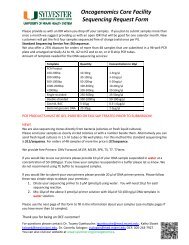SCIENTIFIC REPORT 2004 - Sylvester Comprehensive Cancer Center
SCIENTIFIC REPORT 2004 - Sylvester Comprehensive Cancer Center
SCIENTIFIC REPORT 2004 - Sylvester Comprehensive Cancer Center
You also want an ePaper? Increase the reach of your titles
YUMPU automatically turns print PDFs into web optimized ePapers that Google loves.
T U M O R C E L L B I O L O G Y P R O G R A M<br />
Dr. Werner’s laboratory also is pursuing the<br />
investigation of Ini, a novel transcription factor<br />
that is involved in connexin43 gene regulation at<br />
the transcriptional level. Knockout experiments<br />
in Saccharomyces pombe indicated that the yeast<br />
homolog of Ini is an essential protein. It appears<br />
to be involved in the mRNA splicing process.<br />
SELECTED PUBLICATIONS<br />
2003<br />
Oltra, E, Pfeifer, I, and Werner, R. Ini, a small<br />
nuclear protein that enhances the response of the<br />
connexin43 gene to estrogen. Endocrinology<br />
144:3148-58, 2003.<br />
HIGHLIGHTS/DISCOVERIES<br />
• Demonstrated that, in humans, connexin43 is<br />
expressed in the heart and the uterus, as well as<br />
in many other tissues. Because it is an essential<br />
protein (as determined in mice) that affects<br />
early development, it is important to understand<br />
the mechanisms of its regulation of expression.<br />
In the uterus, connexin43 expression<br />
is inducible by estrogen. This regulation is clinically<br />
important because women who suffer<br />
from premature labor also express connexins<br />
prematurely.<br />
JAMES WYCHE, PH.D.<br />
Professor of Biology<br />
DESCRIPTION OF RESEARCH<br />
One of Dr. Wyche’s interests has been to understand<br />
how anti-cancer drugs induce<br />
apoptosis (cell deaths) of cancer cells. Recently,<br />
he and his colleagues studied how the natural<br />
product camptothecin (CPT) and its semi-synthetic<br />
derivatives such as CPT-11, 9-amino-CPT<br />
(9AC), and 9-nitro-CPT (9NC) induce apoptosis<br />
of human colon cancer cells. Many aspects of the<br />
mechanism by which these drugs exert their<br />
death effect on cancer cells, however, remain<br />
largely unknown. In recent years, Dr. Wyche and<br />
his colleagues have used a cell model of human<br />
colon cancer to demonstrate that treatment with<br />
low doses of CPT induces senescence in the presence<br />
of a protein call p21. Apoptosis, however,<br />
occurs in the absence of p21. Therefore, p21 is a<br />
key determinant of the outcome of colon cancer<br />
cells treated with CPT drugs at doses that are relevant<br />
to clinical application. Thus, CPT treatment<br />
of colon cancer cells with p21 should result<br />
in disease stabilization, whereas CPT treatment<br />
of p21-deficient colon cancer cells should result<br />
in rapid apoptosis and disease regression.<br />
It is well established that p21 inhibits cyclindependent<br />
kinases (Cdks) and several other factors,<br />
including proliferating cell nuclear antigens.<br />
They hypothesize that inhibition of Cdks by p21<br />
is essential to inhibit apoptosis and induce senescence.<br />
In this context, Dr. Wyche and his colleagues<br />
propose that a protein named E2F1 is<br />
essential for apoptosis of colon cancer cells<br />
treated with CPT. According to this hypothesis,<br />
inhibition of Cdks should result in activation of<br />
another protein, named retinoblastoma (Rb),<br />
which in turn, inhibits E2F1 and consequentially<br />
E2F1-dependant apoptosis. They also hypothesize<br />
that the ability of p21 to induce senescence<br />
requires a protein called STAT1. To test their<br />
hypothesis, Dr. Wyche’s laboratory currently is<br />
using techniques to selectively alter the status of<br />
Cdk, E2F1, Rb, and STAT1 genes in human<br />
colon cancer cells. They will then investigate the<br />
role of each protein in the process of apoptosis<br />
and senescence in the colon cancer cells after<br />
CPT treatment.<br />
The information obtained from these investigations<br />
will provide a better insight into the<br />
molecular pathways activated in colon cancer<br />
cells after CPT treatment and eventually will lead<br />
to specific experimental designs to completely<br />
understand how CPTs affect colon cancer.<br />
UM/<strong>Sylvester</strong> <strong>Comprehensive</strong> <strong>Cancer</strong> <strong>Center</strong> Scientific Report <strong>2004</strong> 99
















